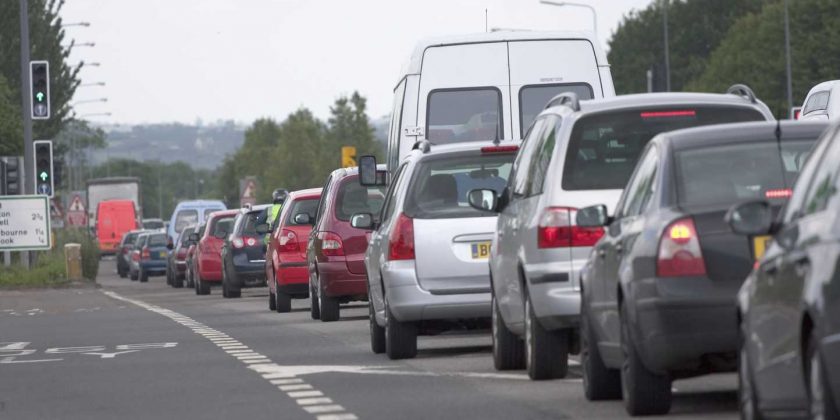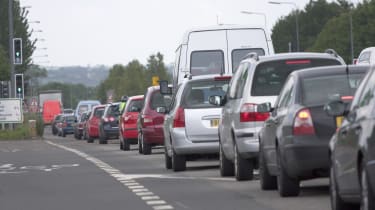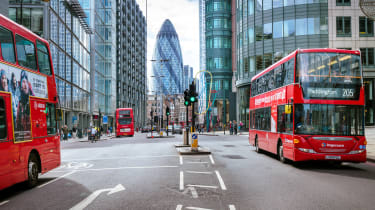The UK’s second-largest city will charge drivers of pre-Euro 4 petrol and pre-Euro 6 diesel cars £8 per day to enter the city centre
Birmingham’s Clean Air Zone will go live on 1 June 2021, it has been announced.
Anyone driving a pre-Euro 4 petrol or pre-Euro 6 diesel car within the limits of the A4540 Middleway Ring Road in the UK’s second-largest city from that date will be charged a daily fee of £8.
Like the London ULEZ, the fee will be payable online, will be enforced by ANPR (automatic number plate recognition cameras), and will be in force 24 hours per day, 365 days per year.
Vans and buses that transport school children or provide community services will be exempt, as will vehicles in a disability tax class. Non-compliant HGVs will have to pay a fee of £50.
Bath Clean Air Zone launching on 15 March 2021
Bath’s Clean Air Zone is going live on 15 March 2021, the city’s authorities have confirmed.
Private cars will be exempt, but non-compliant taxis and vans will be charged £9 per day, while polluting buses and lorries will pay £100.
Bath and North East Somerset Council has announced it will offer financial support to eligible firms that want help upgrading their vehicle fleets in order to be compliant.
Bristol diesel ban scrapped
Bristol has cancelled plans to ban diesel cars from a small area of its city centre and implement a Clean Air Zone.
The city’s mayor announced that the council is instead hoping to draw up new clean air plans for the area that don’t involve charging individuals or businesses.
The abandoned plans were revealed last year and would have seen Bristol become the first UK city to implement any sort of outright ban on diesel cars, had the scheme been implemented in 2021 as originally intended. All diesel cars would have been banned from a small area of the city centre between 7am and 3pm.
Plans for a Clean Air Zone over a wider area of the city have also be scrapped. This would only have affected diesel-powered lorries, vans, buses and taxis, which would have been made to pay a fee. Taxis and vans would have been charged £9 per day, while HGV operators would had to have paid £100.
Leeds delays Clean Air Zone plans indefinitely
Plans to implement a Clean Air Zone in Leeds have been suspended for the foreseeable future due to coronavirus.
The scheme – which was meant to be implemented earlier this year but has faced numerous delays – has been torpedoed by expectations that air quality improvements that have occurred during the coronavirus pandemic could result in the Government withdrawing funding for new Clean Air Zones.
Leeds City Council now says it hopes to review the status of the scheme in the Autumn. A camera network costing £6 million has already been installed in the city to enforce the zone.
The Clean Air Zone wasn’t set to affect privately owned cars, instead applying only to HGVs, buses, coaches and taxis classed as having high emissions. Non-compliant vehicles would be subject to a daily charge of between £12.50 and £50 depending on category.
Brighton and Kent authorities considering banning cars
Cars could be banned from Brighton city centre, as well as town centres across Kent, as local authorities look at ways of reducing carbon emissions.
Brighton and Hove City Council has voted to commission a report looking at the feasibility of banning cars from the city centre by 2023, with details set to be drawn up by October 2020.
• Is your council a clean-air hypocrite?
As well as working out how the ban could be implemented within three years, the report will also examine who should be made exempt from it; the needs of residents with disabilities, taxi drivers and traders are all to be considered.
The motion was proposed by councillors from the Green Party and received the support of members representing both the Labour and Conservative parties. Green Party councillor Amy Heley told the BBC: “This is a sensible step to help our city become carbon neutral by 2030. We would be neglecting our ambitious targets if we didn’t look at transport use.”
Brighton and Hove City Council is part of a group called Transport for the South East, of which Kent County Council and Medway Council are also members. Following Brighton and Hove City Council’s announcement, Kent County Council’s opposition leader – Liberal Democrat Rob Bird – suggested that similar policies could be considered for towns across Kent.
According to Kent Online, Bird told an environment and transport committee meeting: “Looking at the future, we talk about tolling of vehicles, we also must consider absolute bans. “Brighton are looking at a car ban. This is something we will be looking at in several Kent town centres in the near future.”
He added that such policies would have “major ramifications” on getting in and out of town centres.
“Through trips” in Birmingham to be banned
Cars could be banned from making “through trips” in Birmingham city centre under radical new transport proposals put forward by the local authority.
Birmingham City Council says it is “prioritising people over cars” with its newly published Transport Plan, aiming to make the city carbon-neutral by 2030.
• London Congestion Charge guide
One of the proposals involves preventing cars from driving through the centre of Birmingham in order to get from one side of the city to the other. If a driver’s final destination is not inside the city centre, the council wants them to go around via an upgraded ring road, rather than straight through the centre.
The council is also set to introduce a Clean Air Zone to the city on 1 July 2020, covering all roads within the A4540 Middleway Ring Road. It will operate 24 hours a day, 365 days a year, with drivers of non-compliant vehicles (pre-Euro 4 petrol or pre-Euro 6 diesel) having to pay a fee. All revenue raised by the zone is to be reinvested in the city’s transport network.
The Transport Plan also contains numerous proposals for parking within Birmingham, including the introduction of a Workplace Parking Levy and the extension of the city’s Controlled Parking Zones, which remove all free parking in certain areas. The council intends to increase Park and Ride provisions around the city to compensate for this.
In addition, all residential areas would see their speed limits reduced to 20mph under the plan.
Cllr Waseem Zaffar, cabinet member for transport and the environment at Birmingham City Council, said: “ Overdependence on private cars is bad for the health of ourselves and our families, bad for our communities and bad for business as measured by the millions of pounds of lost productivity caused by congestion.
“Ultimately, it is bad for the future because of the very significant damage caused by vehicle emissions and their impact on climate change.”
Oxford and York emission charging zones announced
Oxford and York have announced details of the Clean Air Zones they plan to implement in their city centres this year.
Oxford City Council and Oxfordshire County Council have agreed a plan that would see a zero emission zone known as the ‘Red Zone’ rolled out to five streets in Oxford city centre from 1 December, with motorists not driving a zero emission vehicle (i.e. a fully electric or hydrogen-powered car) between the hours of 7am and 7pm charged £10.
Until December 2024, the councils say various discounts will be implemented for Blue Badge holders and businesses registered within the Red Zone, while residents living in the Red Zone will be given a 90 per cent discount until December 2030. Meanwhile, buses and taxis within the city have an agreed timeline to move to zero-emission fleets.
In addition to the Red Zone, a ‘Green Zone’ will be introduced across the rest of the city centre in 2021 or 2022. This wider area will be free for zero emission vehicles to access, while cars that comply with London’s ULEZ standards (Euro 4 petrols and Euro 6 diesels) will be given a discount.
York’s plan, meanwhile, focuses more on buses. The northern city wants buses that enter its Clean Air Zone five or more times a day to meet ULEB (Ultra-Low Emission Bus) standards (Euro 6 diesel, gas-powered or electric).
In addition, though, City of York Council said in December 2019 that it wanted to end “non-essential” private car journeys within its medieval city centre as part of efforts to become carbon-neutral by 2030.
The idea of some sort of outright ban on private cars – with the exception of those who rely on them, such as the disabled – was proposed by a Labour councillor and received support from a majority of councillors in the authority, which is led by the Liberal Democrats and the Greens.
Other Clean Air Zones
The full list of planned Clean Air Zones can be found here:
Aberdeen
Aberdeen City Council is looking at options for a Low Emission Zone to be implemented in the city centre later this year.
Vehicles that do not meet the necessary criteria will be banned from entering the city centre altogether. The proposed minimum standards are Euro 6 for diesel cars, Euro 4 for petrol cars and Euro VI (roughly pre-2013) for heavy diesel-engined vehicles, such as HGVs and buses.
Bath
Having backpedalled on plans to introduce a Clean Air Zone that would have affected private cars, Bath and North East Somerset is implementing a scheme on 15 March 2021 that will only affect commercial vehicles.
It will see high-polluting buses, coaches and HGVs entering Bath city centre charged £100 a day, while non-Euro 6 diesel or non-Euro 4 petrol taxis, minibuses and vans will have to pay £9 a day.
Birmingham
Birmingham’s Clean Air Zone is coming into force on 1 June 2021, with drivers of cars not meeting Euro 4 petrol or Euro 6 diesel emissions standards being charged to enter the area within the A4540 Middleway Ring Road. The zone will be active 24 hours a day, seven days a week.
Brighton
Brighton and Hove County Council has commissioned a report to look at the possibility of banning cars from its city centre by 2023. The report is due to be published in March and will take the needs of the disabled, as well as taxi drivers and traders, into consideration.
Cambridge
Cambridge City Council claims there are 106 deaths in Cambridge and South Cambridgeshire every year related to poor air quality. The council is devising plans for a Clean Air Zone, but has published no specific details yet.
Cardiff
Cardiff was planning to implement a Clean Air Zone in its city centre, but the plans were rejected amid claims the scheme would merely penalise owners of older cars. Instead, the council set out a number of measures to tackle NOx, such as fitting AdBlue systems to buses.
• London ULEZ explained
Derby
Derby City Council’s preferred option for dealing with air pollution in the city is a new traffic management system. However, the council still has two sets of plans on the table for potential Clean Air Zones.
The first would use the city’s inner ring road as its boundary and would charge non-Euro 4 petrol and non-Euro 6 diesel cars and vans – as well as high-polluting HGVs, buses and coaches – for entering the city centre.
The second scheme would cover a much larger area – right out to Derby’s outer ring road. The council has admitted though that the charges would affect “many people who could not afford to purchase a new vehicle or may be unable to change their travel choices”.
Dundee
Dundee City Council is consulting on plans to implement a Low Emission Zone within the boundary of the city’s inner ring road.
Petrol cars registered before 2006 and diesel cars registered before 31 August 2015, as well as older HGVs and LGVs, would be banned from the zone.
Edinburgh
Edinburgh is still consulting on its Low Emission Zone, with the council still deciding whether to have restrictions that apply to just the city centre for all vehicles or to the whole city but only for commercial vehicles.
Glasgow
Glasgow’s Low Emission Zone came into effect on 31 December 2018, initially only applying to local buses.
The scheme is still being phased in, though. On 31 December 2022, all vehicles entering the city centre zone will be required to meet the relevant standards – Euro 4 for petrol cars, and Euro 6 for diesel cars and any vehicles with heavy diesel engines.
Kent
Kent County Council’s opposition leader has indicated that vehicle tolling or outright car bans could be implemented in towns across Kent in the future. No specific plans have yet been published.
Leeds
The Clean Air Zone in Leeds was due to launch on 6 January 2020, but has been delayed indefinitely due to concerns over funding as a result of the coronavirus. Leeds City Council has been carrying out a review of the forthcoming scheme and says a decision is imminent.
London
London’s Ultra-Low Emission Zone (ULEZ) was the first Clean Air Zone of its kind in the UK when it was introduced in 2019. It’s in force 24 hours a day, seven days a week and currently covers central London’s Congestion Charge zone, although it will be expanded on 26 October 2021 to cover all of the city inside the North and South Circular Roads.
Pre-Euro 6 diesel cars built before around 2016 and pre-Euro 4 petrol cars built before 2006 are affected, having to pay £11.50 on top of the £12.50 daily Congestion Charge. Cars built before 1979 are exempt, though.
Non-Euro 3 motorcycles also have to pay, while non-Euro VI HGVs, buses and coaches are charged £100 a day.
Manchester
If given the go-ahead, Manchester’s proposed Clean Air Zone will start being phased in from 2021. It’s another scheme that wouldn’t affect private cars – just buses, coaches, HGVs, vans and taxis that are deemed to be high-polluting.
The exact boundary for the Clean Air Zone is yet to be decided, but the local authority says it would cover the whole of Greater Manchester, except for roads that form part of the Strategic Road Network managed by Highways England. The scheme would be in operation 24 hours a day, seven days a week.
Newcastle
Following months of consultations, local authorities in Newcastle have decided on a Clean Air Zone to implement. It’s set to come into force in 2021 and won’t affect private cars for the time being.
Meanwhile, diesel HGVs, buses and coaches that don’t meet emissions standards will have to pay £50 a day to enter the city. Petrol taxis and vans will be exempt as long as they meet Euro 4 standards.
Oxford
Oxford plans to implement a zero emission zone in five streets of its city centre from 1 December – motorists not driving a zero emission vehicle would be required to pay £10 during the hours of 7am and 7pm. There will also be a wider charging zone free for zero emission vehicles and discounted for cars that meet Euro 4 petrol or Euro 6 diesel standards.
Portsmouth
Portsmouth had plans for a Clean Air Zone covering the whole of Portsea Island, but scaled the scheme back to just the western side, excluding the city’s international port.
Reading
Reading is another city that has indicated it could implement a Clean Air Zone in the future, but has not released any exact details.
Sheffield
Sheffield City Council plans to introduce a Clean Air Zone within its inner ring road and city centre in early 2021.
The proposed scheme wouldn’t affect private cars – only HGVs, buses, vans and taxis that fail to meet emissions standards. Non-compliant vans and taxis will be charged £10 a day, while HGV and bus operators will be charged £50.
Slough
Slough’s plans for a potential Clean Air Zone are still being worked up, with specific details as yet unknown.
York
York wants buses that enter its city centre five or more times a day to meet ULEB (Ultra-Low Emission Bus) standards, meaning they have to be Euro 6 diesel, gas-powered or electric. City of York Council has also said it want to end “non-essential” travel by private cars within the city.
What are your thoughts on Bristol’s ‘Clean Air Plan?’ Let us know in the comments section below…
Source: Read Full Article





